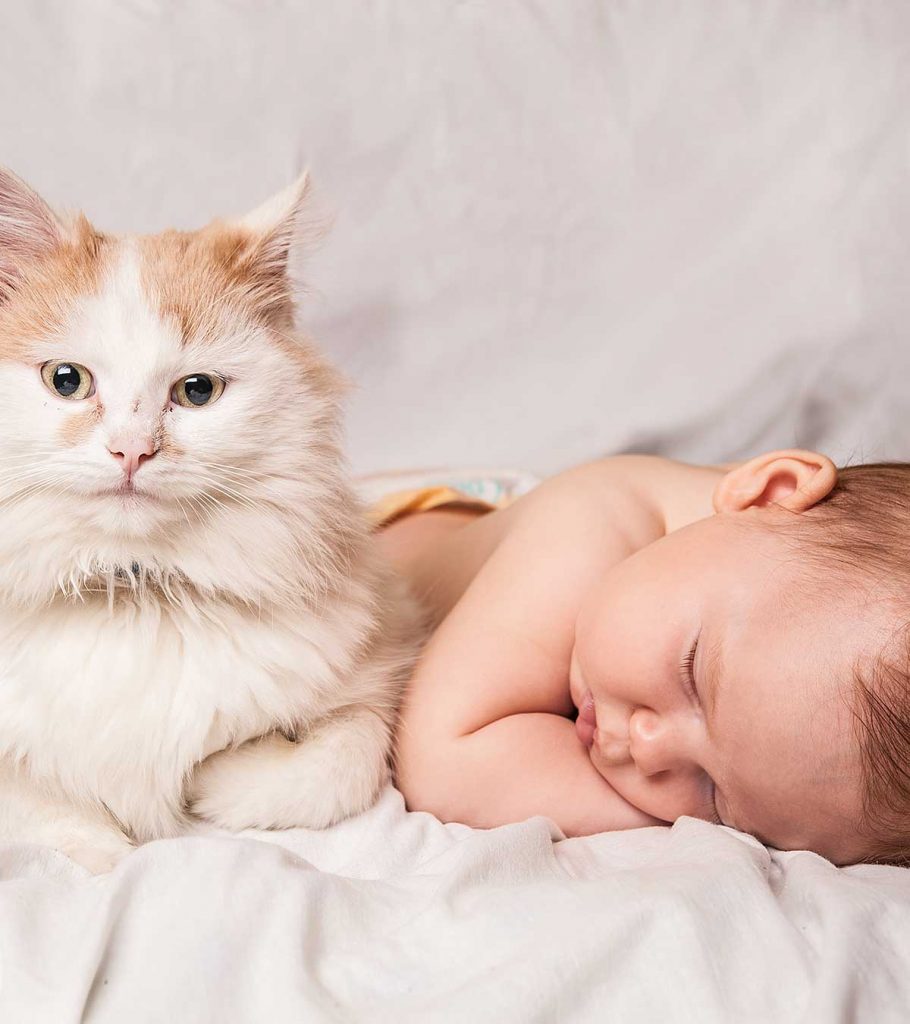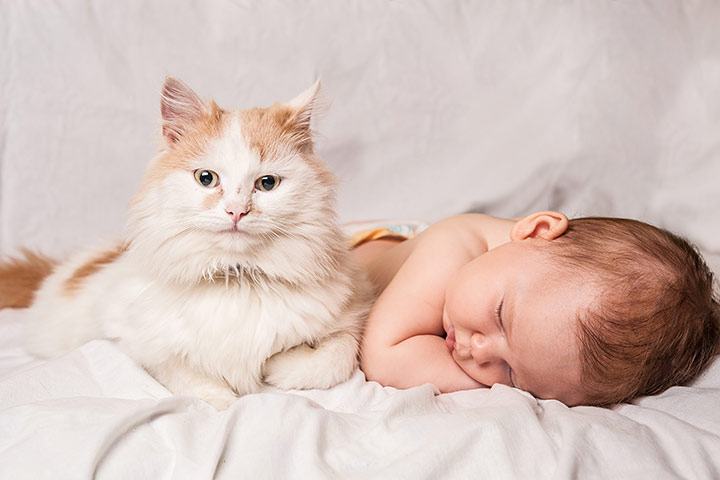Studies suggest the occasional use of the Scottish surnames or last names started somewhere between the 10th and 12th centuries when the Normans introduced them in 1066. However, the more frequent use of Scottish surnames started around the 18th and 19th centuries.
Some of the Scottish surnames are known to have patronymic, habitational, ethnic, topographical, as well as occupational origin. A patronymic name is the one derived from the father’s or any of the male ancestor’s forename. Some of the Scottish surnames are the clan name of some powerful Scottish families that once ruled over that territory.
The Scottish Government maintains a list of surnames in the National Records of Scotland (1). In this MomJunction post, we share 100 most commonly used Scottish surnames with their meanings.
List Of Popular Scottish Surnames Or Last Names
1. Abercrombie
This Scottish surname refers to Abercrombie, a place in Fife, a region in Scotland. Abercrombie means ‘confluence of rivers at a bend’ or the ‘mouth of the bendy river.’
2. Aitken
A popular Scottish surname, Aitken has a patronymic origin, and is derived from the name Adam. The word Adam comes from Hebrew and means ‘man.’
3. Alexander
A Scottish surname that is equally popular in Britain, Dutch, and Germany. Alexander means the ‘protector/defender of mankind.’ The name/surname is derived from a famous Greek word ‘Alexandros,’ which means to ‘protect man’ or ‘defend man.’
4. Allan/Allen
The name likely comes from the Old Gaelic word ‘ail’ that means ‘rock.’ The name ‘Allan’ or ‘Allen’ likely means ‘little rock.’ Another meaning of the name is considered to be ‘handsome.’
5. Anderson
Anderson is a patronymic surname that means ‘son of Andrew.’ The name Andrew is derived from the Greek name Andreas, which means ‘manly’ or ‘masculine.’
6. Archie
Archie is a shorter version of the name ‘Archibald,’ which either means ‘holy prince’ or the ‘bold prince.’
7. Arthur
The name derives from Old Celtic elements ‘artos’ meaning ‘bear’ and ‘viros’ meaning a ‘king.’ The name may have likely referred to a strong king or a man as strong as a bear.
8. Auchter
Auchter is a habitational name derived from a few places named Auchter in Scotland. The name could also be a toponymic one derived from the Gaelic word ‘uachdar’ meaning ‘upland.’
9. Barclay
The surname Barclay is a habitational name that means ‘birch wood’ in Old English. The surname could also be a toponymic one referring to someone who originally belonged to a town named Berkeley situated in the Gloucestershire region of England.
10. Bell
It is derived from the Middle English word ‘belle’ that means bell. The surname was an occupational name for a bell-ringer or bell maker. Alternatively, it could have been a nickname for someone who lived near the town bell.
11. Black
It is derived from the Middle English word ‘blake.’ The name likely referred to those with a dark complexion or those with dark hair. The name may also have been an occupational one for those who made black dye.
12. Blackwood
A Scottish and English surname, Blackwood is a habitational name for someone from any of the several places named Blackwood in Scotland. The surname originates from the Old English word ‘blake wudu’ meaning ‘dark wood.’
13. Boyce
The name is derived from the Old French word ‘bois’ that means ‘wood.’ The name is likely a toponymic one referring to someone who lived near the woods that is close to a forest.
14. Bran
The surname Bran comes from the Gaelic word ‘bran’ meaning a ‘raven.’
15. Braid
A habitational origin, the surname refers to those originally belonged to a place called Braid situated in South Edinburgh in Scotland.
16. Brown
Brown is a frequently used Scottish and English surname. Brown was likely a byname or nickname used to refer someone with a dark reddish complexion or someone with brown hair.
17. Burns
It is a toponymic name for a person who resides by a stream. The name likely originates from the Old English word ‘burne’ that means ‘stream.’
18. Butchart
A surname of Anglo-Saxon origin, Butchart is derived from the personal name ‘Burgheard.’ This name is a combination of the Old English words ‘burgh’ meaning fortress and ‘heard’ meaning ‘brave.’
19. Cameron
The name is derived from the Gaelic phrase ‘cam sron’ meaning ‘crooked nose.’ The name would have been a nickname with someone with a crooked or broken nose.
20. Campbell
The Scottish surname is derived from the Gaelic phrase ‘cam beul’ meaning ‘crooked mouth.’ The name was likely a nickname for someone with a wry or crooked mouth.
21. Cairns
It originates from the Gaelic word ‘carn,’ which means cairn, a heap of rough stones raised as a landmark or a memorial. The name is a toponymic one referring to those who lived by a cairn.
22. Christie
A patronymic name, the Scottish surname Christie means ‘son of Christopher’ or meant ‘Christ bearing.’
23. Craig
Craig is a toponymic surname derived from the Gaelic word ‘creag’ that means ‘crag’ or a ‘rock.’ The name likely referred to those who lived at a crag, a projection of a rocky hill.
24. Crawford
It comes from a combination of two Old English words ‘crawa’ meaning ‘crow’ and ‘ford’ meaning ‘river crossing.’ The name is a toponymic one as well, referring to someone from any of the several places called Crawford in Scotland and England.
25. Cunningham
It is a toponymic name for someone who came from an old place called Cunningham in Scotland. The name is likely derived from the Gaelic word ‘cuinneag’ meaning a ‘milk pail.’
26. Davidson
It is a patronymic name, which means ‘son of David.’ The name David in Hebrew means ‘beloved,’ thus Davidson could also mean ‘beloved son.’
27. Dickson
It is a patronymic name that means ‘son of Dick.’ The name Dick is a shorter form of Richard, which means ‘brave ruler.’
28. Docherty
It is the Scottish variation of the Irish surname Doherty. The surname Doherty likely comes from the Gaelic word ‘Dochartach’ meaning ‘stern’ or ‘hurtful.’ The name was likely a nickname.
29. Donaldson
It is a patronymic name that means ‘son of Donald.; The name Donald comes from an Old Gaelic name ‘Domhnall’ that means ‘ruler of the world.’
30. Duncan
It is an Irish and Scottish surname. Duncan is derived from the Old Gaelic personal name ‘Donnchadh’ that comprises of the Gaelic words ‘donn’ meaning ‘brown’ and ‘cath’ meaning ‘battle.’ The name likely referred to a dark-haired warrior
31. Dunsmore
It is a toponymic name referring to someone from a long-forgotten Scottish place called Dunsmore or Dundemore.
32. Elgin
It is a toponymic name for someone who originally belonged to a place called Elgin, situated in Moray region of Scotland.
33. Falconer/Faulkner
It is derived from Middle English and means ‘falcon-keeper.’ The surname has an occupational origin and was used for individuals who owned and trained falcons.
34. Falla
It is a toponymic name for someone from a place called Fala located in the Midlothian council area of Scotland.
35. Ferguson
Ferguson has a patronymic origin and means ‘son of Fergus.’ The name Fergus originates from the Gaelic word ‘Fearghas,’ which comprises of the Gaelic elements ‘fear’ meaning ‘man’ and ‘gus’ meaning ‘vigor.’
36. Findlay
It is a variant of the Old Gaelic name Fionnlagh that compromises of Gaelic elements ‘fionn’ meaning white or fair and ‘laogh’ meaning warrior or hero. The surname, thus, originally referred to a light-skinned warrior.
37. Fowler
It is an occupational surname for someone who was a keeper of fowls or a birdcatcher. The name likely originates from the Old English word ‘fugelere’ that means birdcatcher.
38. Forbes
It is a toponymic name referring to someone from a place called Forbes located near Aberdeen in Scotland. The word Forbes is derived from the Gaelic word ‘Forba’ meaning a ‘field.’
39. Gibson
It is a patronymic name that means ‘son of Gib.’ The name Gib is a shorter form of the name Gilbert, which comes from Old German and means ‘bright pledge.’
40. Gilchrist
It is derived from the Old Gaelic phrase ‘giolla Chriost’ that means ‘servant of Christ.’
41. Gilmore
In Scotland, Gilmore is the shortened Anglicized form of the Gaelic name ‘Mac Gille Mhoire,’ or ‘Mac Giolla Mhuire,’ which means ‘servant of (the Virgin) Mary.’
42. Gordon
It is a toponymic name for someone from a place called Gordon located in the Berwickshire region of Scotland. The name Gordon is made from the Welsh elements ‘gor’ meaning large or spacious, and ‘din’ meaning ‘fort.’
43. Gray
The name likely came from English and was used a nickname for someone with grey beard, hair, or clothes.
44. Graham
It is a toponymic name referring to someone who originally belonged to a place called Grantham in England. The name Grantham likely comes from Old English and means ‘gravelly homestead.’
45. Grant
The name likely comes from the Norman-French word ‘graunt’ or ‘graund’ that means large or tall. The surname was likely used as a nickname for someone who had a large built or had a tall stature.
46. Hamilton
It is a toponymic surname referring to someone who comes from any of the several places called Hamilton in the UK. The name Hamilton comes from the Old English words ‘hamel’ meaning ‘crooked’, and ‘dun’ meaning a ‘hill.’
47. Henderson
It means ‘son of Hendry or Henry.’ The name Hendry or Henry comes from the Old German name ‘Heimirich’ that means ‘ruler of the home.’
48. Hill
The surname is a toponymic one and was indicative of individuals who resided by or on a hill.
49. Hughes
It is derived from the name Hugh, which comes from an Old Anglo-Norman name ‘Hug’ that meant ‘heart’ or ‘mind’ or ‘spirit.’
50. Innes
It is a toponymic name for someone who came from the clan of Innes that belonged to Moray, a county in Scotland. The name Innes has its origins in the Gaelic word ‘inis,’ that means ‘island.’
51. Jamieson
It is a surname that means ‘son of James.’ The name James comes from the Hebrew name ‘Yaaqov’ that means the supplanter or the substitute.
52. Jack
It is a medieval era variant of the name John, which comes from the Hebrew name ‘Yochanan’ meaning ‘God is gracious.’
53. Johnston
It is a toponymic name for someone from a place called Johnstone in Scotland. The surname is a combination of the Middle English words ‘John’ referring to someone named John, and the word ‘toun’ meaning ‘town.’
54. Jones
It is an old variant of the name John. The name John has its origin in the Hebrew name ‘Yochanan’ that means ‘God is gracious.’
55. Kendrick
It is the shorter form of the name McKendrick, which is an Anglicized form of the Gaelic name ‘Mac Eanraig’ meaning ‘son of Henry.’ The name Henry comes from the Old German name Heimirich, meaning ‘ruler of the home.’
56. Kerr
It comes from the Scottish Gaelic word ‘Kerr’ meaning ‘wet and rough ground.’ The name would have been a toponymic one referring to those who lived close to an area with a constant wet ground.
57. Kelly
It is a toponymic name for someone from a few places named Kelly in Scotland. The word Kelly is likely derived from the Cornish language word ‘coille’ meaning a ‘grove.’
58. Kenneth
The surname originates from ‘Coinneach,’ a Gaelic personal name that means ‘handsome.’
59. Lawson
It is a patronymic name that means ‘son of Laurence.’ The name Laurence comes from an Old Roman name ‘Laurentius’ meaning from Laurentum, which was a city in Ancient Italy.
60. Leishman
It means ‘servant of Leish.’ The name Leish is a variant of the name ‘Gillis’ which is a shorter form of the Gaelic name ‘Mac Gille Iosa’ meaning the ‘son of the servant of Jesus.’
61. MacDonald/McDonald
It is a patronymic name that means ‘son of Donald.’ The name Donald comes from the Gaelic name ‘Domhnall’ meaning ‘ruler of the world.’
62. Mackay
A common Scottish and Northern Irish surname, ‘Mackay’ originates from the Gaelic name ‘Mac Aodha,’ meaning ‘son of Aodh.’ The name ‘Aodha’ or ‘Aodh’ comes from Old Gaelic and means fire.
63. Marshal
It is derived from Old English word ‘mareschal,’ which comes from Old German elements ‘marah’ meaning ‘horse’ and ‘scalc’ meaning ‘servant.’ The name Marshal was likely a title for someone who was a stable owner or someone who loved horses.
64. Martin
The surname Martin originates from ‘Martinus,’ a Latin name derived from ‘Martis,’ which was the name of the Roman God of ‘Mars.’
65. McGregor
It originates from the Gaelic name ‘Mac Griogair,’ meaning ‘son of Griogar.’ The name ‘Griogar’ is derived from the personal name ‘Gregory,’ which comes from the Old Greek name ‘Gregoros’ meaning ‘watchful’ or ‘alert.’
66. McIntyre
McIntyre originates from the Gaelic name ‘Mac an tSaoir,’ which means ‘son of a craftsman.’
67. McIntosh
It is the Anglicized version of the Gaelic name ‘Mac an Toisich,’ which means ‘son of the chief.’
68. McKenzie
The surname originates from the Gaelic name ‘MacCoinnich’ meaning ‘son of Coinneach.’ The name Coinneach comes from Old Gaelic word ‘caoin’ meaning ‘handsome.’
69. McLean
McLean is an Anglicized form of the Gaelic name ‘Mac Giolla Eoin’ meaning ‘son of the servant of Eoin.’ The name Eoin is a variant of the name John, which comes from the Hebrew name ‘Yochanan’ meaning ‘God is gracious.’
70. McLeod
It comes from the Gaelic name ‘Mac Leoid’ meaning ‘son of Leod.’ The name Leod comes from the Old Norse personal name ‘Ljotr’ meaning ‘ugly.’
71. McMillan
Mcmillan originates from Gaelic ‘Mac Maolain,’ a name of patronymic origin derived from the byname ‘Maolan.’ This name is derived from the Gaelic word ‘maol’ meaning bald.
72. Millar
It is a variant of the name Miller, which is an occupational name for someone who worked as a miller or as a mill keeper.
73. Miller
Miller has an occupational origin and refers to someone who worked as a miller, an individual who grinds grains in a mill for a living.
74. Milne
The name is derived from the Middle English word ‘milne’ that means mill. The surname Milne is an occupational one and would have referred to someone who worked as a miller.
75. Mitchell
The surname originates from the personal name Michel, a vernacular form of Michael. The name Michael comes from the Hebrew name ‘Mikhael,’ meaning ‘who is like God.’
76. Morrison
It means ‘son of Morris.’ The name Morris is a variant of the name Maurice, which comes from the Old Latin name ‘Maurus’ that referred to someone who was dark-skinned or swarthy.
77. Murray
Murray is a toponymic name and refers to someone who originally belonged to a place called Moray in Scotland. The name Moray comes from Celtic language and means ‘sea settlement.’
78. Muir
Muir originates from the Middle English word ‘More’ referring to a ‘fen’ or ‘moor.’ The name is a toponymic one referring to individuals who lived on a moor.
79. Murphy
The surname Murphy is derived from the Gaelic ‘O Murchadha’ or ‘Mac Murchadha,’ both originating from the word ‘murcadh,’ which means ‘sea warrior.’
80. Napier
It is an occupational name that means ‘cloth keeper’ or ‘linen keeper’ in Middle English. The name traces its origins to the Old French word ‘nappe’ meaning a table cloth.
81. Owen
It is derived from the Gaelic name ‘Mac Eoghain,’ meaning ‘son of Eoghain.’ The name Eoghain is likely a variant of the name Eugene, which comes from the Old Greek name ‘Eugenes,’ meaning ‘well-born.’
82. Paterson
It is a patronymic name that means ‘son of Patrick.’ The name Patrick comes from the Old Latin name Patricius meaning a ‘nobleman.’
83. Reilly
A diminutive form of ‘O Reilly,’ which is a shorter form of the Gaelic name ‘O Raghailligh,’ meaning ‘descendant of Raghailleach.’ The name Raghailleach likely has an Irish origin.
84. Robertson
It means ‘son of Robert.’ The name Robert comes from an Old German name ‘Hrodebert’ that means ‘bright fame,’ referring to someone who was very popular or famous.
85. Ross
It is a toponymic name referring to someone from any of the several places called Ross in Scotland. The name Ross comes from the Gaelic word ‘ros,’ which refers to a headland or promontory – a rock projecting into the sea beyond the coastline.
86. Ritchie
Ritchie is a short form of the personal name ‘Richard.’ The name Richard comes from Old German and means ‘brave ruler.’
87. Russel
Russel is derived from ‘Rousel,’ an Anglo-Norman French nickname referring to someone with red hair or one with a ruddy complexion.
88. Shaw
The name likely originated from the Gaelic word ‘sithech’ that means ‘wolf.’
89. Simpson
It means ’son of Sim.’ The name Sim is a shorter form of the name Simon, which comes from the Hebrew name ‘Shimon’ meaning ‘he has heard.’
90. Sinclair
It is a toponymic surname that originally referred to those who belonged to the old Norman French town of Saint Clair. The name Clair comes from the Late Latin name ‘Clarus,’ which means ‘pure,’ ‘renowned,’ or ‘illustrious.’
91. Taylor
A surname derived from the Old French word ’tailleur,’ which means tailor. This surname is an occupational one for those who were originally in the profession of tailoring.
92. Thomson/Thompson
It means ‘son of Thomas.’ The name Thomas comes from the Old Greek name ‘Taoma’ meaning ‘twin.’
93. Walker
A Scottish and English surname, ‘Walker’ has an occupational origin and referred to those who worked as a fuller or someone who is involved in fulling garments or clothes.
94. Watson
It is a patronymic name that means ‘son of Walter.’ The name Walter comes from Old German and means ‘ruler of the army.’ The name may have originally referred to someone who worked as a military general.
95. Watt
Watt originates from the Middle English birth name Wat or Watt, which is a diminutive form of the name Walter. The name Walter is from Old German, and means ‘ruler of the army.’
96. White
It is derived from the Middle English word ‘whit,’ meaning white. This surname would have been a pet name for an individual with a pale complexion or one with white hair.
97. Wilson
It means ‘son of William.’ The name William comes from the Old German name ‘Willahelm’ that means ‘willful protector’ or ‘valiant guardian.’
98. Williamson
It means ‘son of William.’ The name William comes from the Old German name ‘Willahelm’ that means ‘willful protector.’
99. Wood
It comes from Old English, and is a toponymic name for those who lived by a wood or forest. Wood also would have an occupational surname for those worked as woodcutters.
100. Wright
It is an occupational surname that comes from the Old English word ‘wryhta’ that means a wright – someone who works as a craftsman.
Scottish surnames or last names are unique, with each name depicting an interesting bit of history. Many of the Scottish surnames are Anglicized forms of common Gaelic pet names, which makes for an interesting origin. While some of the surnames are gender-specific, others may be used for both sexes.
Do you know of any more Scottish surnames? Do let us know of them in the comment section below.









